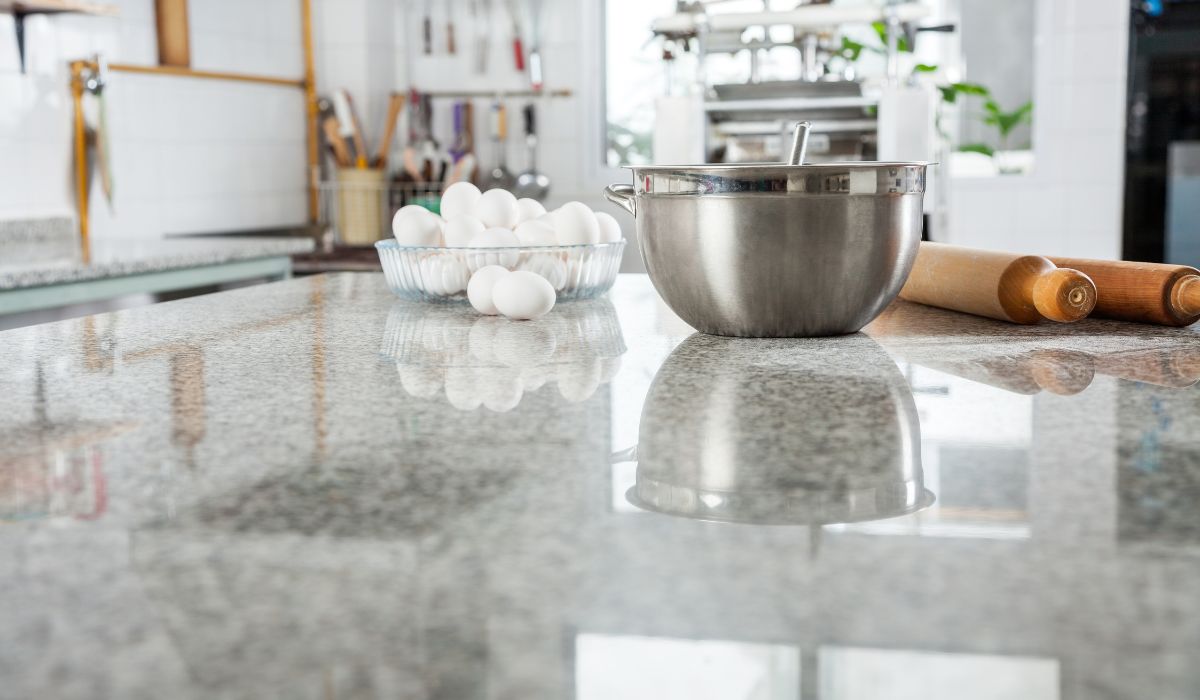|
Germ-Resistant Countertops. Whether you're a germaphobe or not, this stat on common bacteria in the kitchen is sure to get you thinking about them: One study found that kitchen sinks and the surrounding area have up to 15% E. coli and 44% fecal matter traces present. So, it's with little wonder that choosing Germ-Resistant Countertops is ideal for your home. Today, we will review the different materials available and provide tips on how to keep them well-maintained (and germ-free!). The Best Choice for Germ-Resistant Countertops? Non-Porous Countertop MaterialsWhen maintaining a clean and healthy kitchen, opting for non-porous countertop surfaces should be at your list. These surfaces don't allow for bacteria, viruses, and other germs to penetrate, making it exponentially easier to keep your kitchen clean. Plus, non-porous materials like quartz and solid surface (Corian) offer a sleek and modern look that fits perfectly with any kitchen décor. The great thing about these options is that they're also very low maintenance. You won't need to worry about stains or scratches too much, and you can easily disinfect them without worrying about damaging the surface. Ultimately, choosing non-porous countertops is an investment in both form and function. Quartz Countertops: Durability Meets StyleFor those seeking a robust and fashionable germ-resistant countertop option, quartz is the ideal choice. Engineered from natural minerals combined with resin binders, they offer excellent resistance against stains, scratches, and heat damage. Plus, their low maintenance requirements make them perfect for busy households. Solid Surface Countertops: Versatile DesignSolid-surface countertops, on the other hand, provide endless design possibilities due to their customizable nature. With seamless joints and an extensive range of colors available—not to mention their inherent germ-resistant properties—these versatile counters are both practical and visually appealing. Corian® Countertops For the Cleanest SpacesCorian countertops (solid surface) is a top choice for many homeowners. Its non-absorbent nature makes it an ideal material for keeping a germ-free kitchen atmosphere. Not only are these kitchen countertops stain-resistant and ultra-durable, but they're also repairable, heat-resistant, and blade-resistant. The seamless design of Corian® solid surface kitchen countertops ensures that there are no crevices or seams where germs can hide. This makes cleaning a breeze - simply wipe down the surface with soap and water or your favorite disinfectant spray. Here are some helpful tips for keeping your Corian countertop germ-free:
Granite Countertops: Classic Kitchen Countertops For A ReasonThis material is another popular option when considering countertop surfaces that minimize germs in your kitchen. This natural stone material offers unique aesthetics but requires periodic sealing to reduce porousness, which can harbor bacteria if not properly maintained. For this reason, it's crucial to seal them regularly. Sealing helps fill the tiny pores on the surface, preventing bacteria and viruses from settling in. Typically, experts recommend resealing every 6-12 months depending on usage. How to Maintain Hygiene on Granite Countertops:
Laminate Countertops: An Affordable and Germ-Resistant AlternativeIf you're on a budget but still want to prioritize germ-resistant countertops in your kitchen, laminate countertops are an affordable alternative to pricier options like granite or quartz. While they may not be as durable, laminate counters can still provide a stylish look suitable for any modern kitchen setup. Laminate countertops come in various styles, ranging from realistic wood grains to sleek stone patterns. Cleaning Tips for Laminate Counters:
Wrapping Up Antimicrobial CountertopsChoosing the right countertop surface can not only enhance the aesthetic appeal of your kitchen but also contribute to a germ-resistant environment. Quartz and Corian® solid surface countertops are non-porous options that offer durability and versatility, while granite countertops require proper sealing and regular cleaning for optimal hygiene. Investing in germ-resistant countertops is an essential step towards creating a healthy home environment. Van Countertops offers a wide range of materials to choose from that meet both style preferences and functional needs. Reach out to us now and discover more about our offerings! Contact Van Countertops for expert advice on selecting the perfect countertop for your needs. FAQs About Germ-Resistant, Antimicrobial CountertopsWhat is the most antibacterial countertop? Germ-Resistant Countertops with Quartz has the most antimicrobial properties, as it is non-porous and highly resistant to bacteria growth. Its durability and low maintenance requirements make it an ideal choice for homeowners seeking a hygienic surface. What is the most hygienic countertop for the cleanest spaces?Quartz countertops are considered the most hygienic due to their non-porous, stain resistant nature, which prevents bacteria from penetrating the surface. Additionally, they require minimal maintenance and are easy to clean with mild soap and water. What is the cleanest material for countertops?Quartz remains the cleanest, stain resistant material for kitchen and bathroom countertops because of its non-porous composition that resists staining and bacterial growth. It also requires minimal upkeep compared to other materials like granite or marble. Do quartz countertops hold bacteria?No, quartz Germ-Resistant Countertops do not hold bacteria due to their non-porous structure, making them an excellent option for maintaining a sanitary kitchen environment. Regular cleaning with gentle soap and water will keep your quartz surfaces free of harmful microbes. Comments are closed.
|
Archives
March 2023
Categories |

